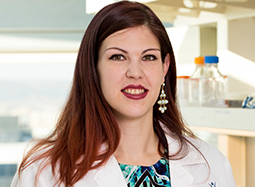Graduate student spotlight: On the hunt for ways to fix faulty cellular signals
September 10, 2019

Every other month, we highlight one of Van Andel Institute Graduate School’s doctoral students. This month features Katie Hollis, a student in the lab of Dr. Bart Williams who seeks to uncover how and why a communication breakdown between cells can contribute to diseases like cancer and osteoporosis.
Q: How would you describe your area of study to your family?
KH: I study the finer details of disease-related signaling. Think of each cell in your body as a room in a house. Imagine the signals that turn on and off are like the lights in the room. If one of those lights starts to flicker due to faulty wiring, you would need to figure out which wire it is and fix it to prevent a fire from starting. In our cells, a faulty signal can cause diseases like cancer. My research is like being the electrician for your cells. Our lab looks at Wnt signaling, a particular type of signaling that has been shown to cause osteoporosis, cancer and that can even affect development when it is faulty. By modeling this faulty signaling, we try to determine which “wires” are responsible for causing the problem, so that we can find ways to prevent or treat the diseases they cause.

Q: What do you want to do with your degree?
KH: While I am currently exploring some of my options, I know that I want to keep asking and hopefully answering new scientific questions. Recently, I have also discovered that science communication is important to me and want that to play a large role in my future career.
Q: Did you take time off before starting your Ph.D. degree or come directly from an undergraduate or master’s degree program?
KH: I came directly from a Master’s program, but I took time off between my Bachelor’s and Master’s degrees to explore my job options in science. I also worked as a middle school and high school teacher for a few years. I realized I missed being more hands on with science, so I worked as a food microbiologist and a research consultant for a biotech startup company for some time. Trying to launch a company and a new drug made me realize I had a lot more to learn, so I decided to pursue graduate school.
Q: How has your previous coursework contributed to your breadth of knowledge?
KH: Across my two degrees at Purdue, I managed to take almost every upper level biology course offered along with some obscure, non-biology classes that just sounded interesting. This variety of coursework not only helped me discover where my interests lie but has also allowed me to approach my research by looking at the bigger picture and attempt to bridge gaps between niche fields.
Q: Do you think there is any value in social networking with other graduate students in non-related fields?
KH: Absolutely! My network includes not only other graduate students in various areas of biology, but also in quantum physics, engineering, medicine, business, education, paleo-archeology and beyond. In discussions with them, I have been able to look at problems from a new angle and on the tough days, appreciate that the grass isn’t always greener on the other side.
Q: Did your past experiences in life or education help prepare you for graduate school or did you have to develop different strategies to succeed?
KH: My past experiences prepared me for asking the big questions and thinking critically about how someone could theoretically tackle them. In graduate school, reality set in. I have had to adapt that critical thinking into experiments that could be realistically accomplished by me and the resources available. I was a very fast-paced person that liked to multi-task and get things done, but I quickly learned that when establishing new protocols, it is better to take my time and be precise. Since being in graduate school, I have had to refine my sense of what can really be accomplished in a day. I have had to cut my to-do lists in half and build in more time for things to not always work as expected.
Q: What is your favorite stress-reduction technique?
KH: I find cooking relaxing. It’s the one experiment that almost always works the way I expect it to.
Q: What accomplishment (academic or other) are you most proud of?
KH: My greatest accomplishment has been fostering and eventually adopting a young girl while in graduate school. She has seen me struggle through experiments and does a little cheer with me when my Western blots work. Persevering through my Ph.D. has become not only something I am doing for myself, but also to show her that with some curiosity, determination and hard work, we can accomplish anything. Tackling these two large life endeavors simultaneously has not been easy, but it has been rewarding.
Q: If you were asked to put something in a time capsule for each year you have been in the program and this capsule would not be opened for 25 years, what would you contribute?
KH: Each year I would compile a book of all of the sticky notes I have generated with random thoughts and ideas for my thesis project. It would be interesting to see how they evolve from grandiose to more realistic over the course of my transitioning from student to scientist.
